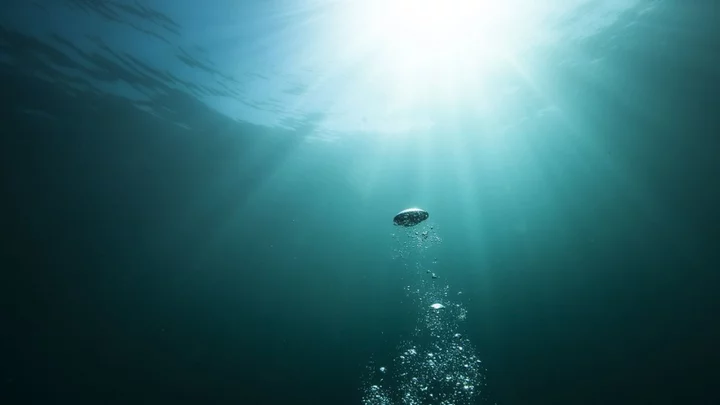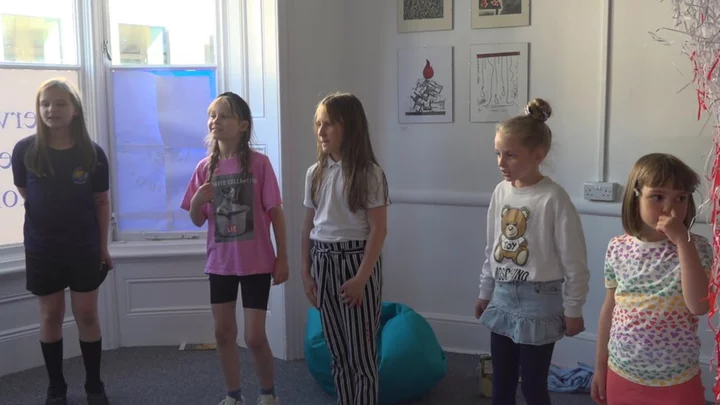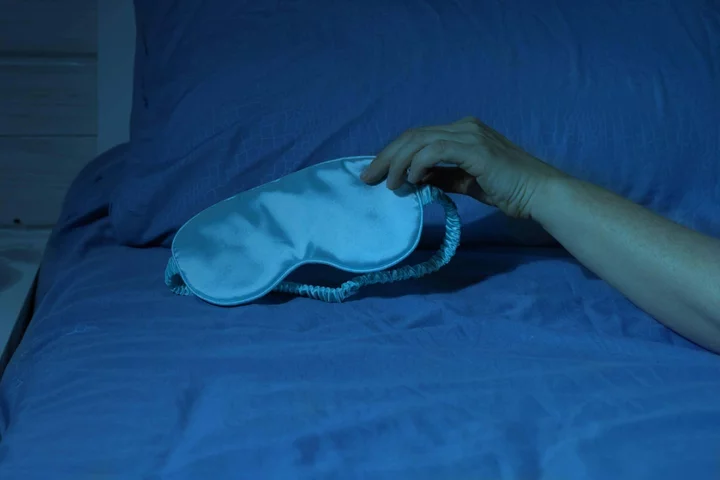
Russia renews missile attacks on Ukrainian cities
A wave of attacks is reported on Kyiv and other cities but there are no reports of any injuries.
2023-06-20 16:48

Morocco media guide
An overview of the media in Morocco, including links to broadcasters and newspapers.
2023-06-20 16:22

The family of Keenan Anderson, who died after being tased by LAPD officers, has filed a wrongful death lawsuit
The family of a 31-year-old father who died after being tased by Los Angeles police officers is suing the city and members of the department over his death, their attorneys announced on Monday.
2023-06-20 15:50

Anxious neighbours sigh in relief as US and China talk
US Secretary of State Antony Blinken's visit reassures a region caught between the rival sides.
2023-06-20 14:58

Scientists found the oldest water on the planet and drank it
If you found water that was more than two billion years old, would your first instinct be to drink it? One scientist did exactly that after finding the oldest water ever discovered on the planet. A team from the University of Toronto, led by Professor Barbara Sherwood Lollar, came across an incredible find while studying a Canadian mine in 2016. Tests showed that the water source they unearthed was between 1.5 billion and 2.64 billion years old. Given that it was completely isolated, it marked the oldest ever found on Earth. Sign up to our free Indy100 weekly newsletter Remarkably, the tests also uncovered that there was once life present in the water. Speaking to BBC News, professor Sherwood Lollar said: “When people think about this water they assume it must be some tiny amount of water trapped within the rock. “But in fact it’s very much bubbling right up out at you. These things are flowing at rates of litres per minute – the volume of the water is much larger than anyone anticipated.” Discussing the presence of life in the water, Sherwood Lollar added: “By looking at the sulphate in the water, we were able to see a fingerprint that’s indicative of the presence of life. And we were able to indicate that the signal we are seeing in the fluids has to have been produced by microbiology - and most importantly has to have been produced over a very long time scale. “The microbes that produced this signature couldn’t have done it overnight. This has to be an indication that organisms have been present in these fluids on a geological timescale.” The professor also revealed that she tried the water for herself – but how did it taste? “If you’re a geologist who works with rocks, you’ve probably licked a lot of rocks,” Sherwood Lollar told CNN. She revealed that the water was "very salty and bitter" and "much saltier than seawater." Have your say in our news democracy. Click the upvote icon at the top of the page to help raise this article through the indy100 rankings.
2023-06-20 14:56

Ulster University: Magee campus to get millions from Irish government
The Irish government is expected to approve more than £42.7m for several all-island projects today.
2023-06-20 13:58

Missing Glastonbury? Here’s how to have a festival feast at home
With Glastonbury kicking off today, it’s safe to say that festival season is officially in full swing. Didn’t manage to get tickets this year? Not to worry! From food to tunes, here’s everything you need to recreate the ultimate Glasto experience at home… Dress to impress It’s time to whip out the flower crowns and get decked out in your best festival gear – just because you’re at home, doesn’t mean you can’t dress to impress. Think fancy dress, glitter, fringing… anything goes! If you’re looking for inspo, try searching “Glastonbury festival fashion” on Pinterest and scroll until your heart’s content. Crank the tunes up What’s a festival without music? If you have a projector, you could get out in the garden and stream the official Glasto set, or simply pop the Spotify Glastonbury 2023 playlist on and have a boogie. Even better, if you have musically gifted friends in your group, get them to get their instruments out and put on a headline show of their own. Enjoy a festival feast Of course, music is important, but food is also an essential part of the festival vibe. Get inspired by Glastonbury’s food stalls with these recipes… Halloumi, chip and tzatziki pitta with salad Serves: 2 Ingredients: 1 garlic clove 1 tsp dried oregano 2 wholemeal pittas 1 midi cucumber 50g baby leaf salad 200g halloumi 2 white potatoes 80g natural yoghurt 15ml white wine vinegar 5g mint 1 red onion Method: 1. Preheat the oven to 220C/200C (fan)/gas 7. Boil half a kettle. Peel and finely slice the red onion. Add the sliced red onion to a bowl, cover with boiled water and set aside for later. 2. Cut the potatoes (skins on) into thin chips, then add them to a baking tray with the dried oregano, a drizzle of vegetable oil and a pinch of salt. Give everything a good mix up and put the tray in the oven for 25-30 min or until crisp. Meanwhile, peel and finely chop (or grate) the garlic. 3. Strip the mint leaves from their stems and chop them roughly, discard the stems. Grate half the cucumber and slice the rest into batons. Add the chopped garlic, chopped mint and grated cucumber to a bowl with the natural yoghurt and mix it all together – this is your tzatziki. 4. Drain the sliced red onion in a sieve and rinse under cold water. Return to the bowl and add the white wine vinegar with a generous pinch of sugar. Stir to combine and set aside to pickle – these are your quick-pickled onions. 5. Slice the halloumi widthways into 4 equal-sized strips. Then slice each strip in half so you are left with 8 halloumi sticks. Heat a large, wide-based pan (preferably non-stick) with a drizzle of olive oil over a medium-high heat. Once hot, add the halloumi sticks and cook for 2-3 min on each side or until golden. 6. Once the chips are almost done, add the pittas to the tray. Return the tray to the oven and cook for 2-3 min or until warmed through. 7. Wash the baby leaf salad, then pat it dry with kitchen paper. Fill the warmed pittas with the chips, golden halloumi sticks, cucumber batons and a handful of baby leaf salad. Top with the tzatziki and quick-pickled onions then wrap in the tin foil to hold it all together – these are your halloumi, chip and tzatziki pittas. Serve the halloumi, chip & tzatziki pittas with any remaining tzatziki and baby leaf salad to the side. Fluffy bao buns Makes: 12 Ingredients: 7g fast-action yeast 2 tbsp caster sugar 340g plain flour ½ tsp baking powder ½ tsp bicarbonate of soda Bamboo steamer or bain-marie Method: 1. Combine the yeast and sugar in a bowl with 150ml of warm water. Mix and set aside for 10-15 mins. Sift in the flour, baking powder, bicarb and a pinch of salt, then combine to form a dough ball. 2. Knead onto a floured surface for 5 minutes, until the dough is perfectly smooth. Place it in a greased bowl, cover with a towel and leave to rise in a warm place for 1 hour. 3. Place twelve 1-cm squares of baking paper on a large baking tray. Roll your dough until it’s ½cm thick and cut out twelve circles with a 7cm round cookie cutter. 4. Place each circle on a square of paper and brush with veg oil (so they don’t stick when folded). Fold each one in half, cover the tray with cling film and leave in a warm place for another hour to puff up. 5. Once risen, steam in batches for 9-11 minutes until cooked through. Add your chosen filling and serve warm. DIY double cheeseburger Serves: 2 Ingredients: 2 sesame seed buns 400g minced beef 1 tsp vegetable oil 4 slices of cheese ¼ iceberg lettuce (finely shredded) 2 gherkins (sliced) ½ white onion (finely diced) For the burger sauce: 2 tbsp mayonnaise 2 tbsp ketchup 2 tsp yellow Mustard 1 tsp smoked paprika 1 tbsp pickle juice ½ tsp cayenne pepper Method: 1. Generously season your beef mince with salt and pepper in a bowl and mix until sticky to the touch. Divide the mixture into 4 equal portions, shape them into patties, and pop them into the fridge on a parchment-lined tray. 2. Whip up your burger sauce by combining all your ingredients in a bowl and giving it a good mix. 3. Slice the burger buns into 3 and toast them in a dry frying pan until golden brown. 4. Heat a frying pan on medium heat with a splash of vegetable oil and fry your patties for 5-7 minutes. Top tip: use a spatula or burger weight to keep your patties flat while cooking. 5. Add a slice of cheese to each patty and turn off the heat when the cheese starts to melt. 6. Build your Gousto Burgers with shredded lettuce, a cheesy patty and a layer of sliced gherkin, diced onions and burger sauce. Pop in the middle of your burger bun and repeat. Don’t forget the bar Enjoy some delicious summery cocktails with these recipes. Mojito Ingredients: Juice of 1 lime 1 tsp sugar Small handful of mint leaves, plus more to serve 60ml white rum Soda water, to taste Method: 1. Slap your mint leaves between your palms once, then add them to a small jug. 2. Gently muddle the lime juice, sugar and mint leaves in a small jug, crushing the mint as you go. The end of a rolling pin works well for this. 3. Pour into a tall glass and add a handful of ice. 4. Pour in your rum and give it another stir with a spoon. 5. Top up with soda water, garnish with mint and serve. Bellini Ingredients: 500 ml peach purée or peach nectar 1 bottle of prosecco Method: 1. Fill your glasses with 1/3 peach purée. 2. Top them off prosecco, and serve. Gousto offers over 250 recipes from expert chefs to choose from each month, from £2.99 per portion. Visit gousto.co.uk for more information.
2023-06-20 13:53

War in Ukraine: TV reporter fled to safety in Belfast
Former TV reporter and presenter Kateryna Fuglevych recalls her frightening journey out of Ukraine.
2023-06-20 13:29

Oxford children's choir helps Ukrainian refugees 'not feel alone'
The group holds weekly session in Oxford for young refugees forced to flee their homes by war.
2023-06-20 13:18

Taiwan kindergarten druggings spark alarm among islands' parents
At least eight children at a preschool were found with trace amounts of sedatives in their system.
2023-06-20 12:58

Regular daytime naps could be good for the brain, study shows
Regular daytime naps could be good for brain health, new research suggests. Daytime napping could slow the rate at which brains shrink as we age, the study led by researchers at UCL and the University of the Republic in Uruguay found. The researchers hope their findings into the health benefits of sleeping during the day will reduce any stigma that still exists around daytime napping. The study suggests the average difference in brain volume between people programmed to be habitual nappers and those who were not was equivalent to 2.6 to 6.5 years of ageing. Our findings suggest that, for some people, short daytime naps may be a part of the puzzle that could help preserve the health of the brain as we get older Dr Victoria Garfield, UCL Senior author Dr Victoria Garfield, MRC Unit for Lifelong Health & Ageing at UCL, said: “Our findings suggest that, for some people, short daytime naps may be a part of the puzzle that could help preserve the health of the brain as we get older.” The study, published in the journal Sleep Health, analysed data from people aged 40 to 69. Past research has suggested people who have had a short nap perform better in cognitive tests in the hours afterwards than those who did not nap. The new study looked at whether there was a causal relationship between daytime napping and brain health. Researchers looked at 97 snippets of DNA thought to determine people’s likelihood of habitual napping. They compared measures of brain health and cognition of people who are more genetically programmed to nap with people who did not have these changes in DNA, using data from 378,932 people from the UK Biobank study. They found that, overall, people predetermined to nap had a larger total brain volume. The genetic variants – DNA changes – influencing the likelihood of someone to nap were identified in an earlier study looking at data from 452,633 UK Biobank participants. But the researchers did not find a difference in how well those programmed to be habitual nappers performed on three other measures of brain health and cognitive function. Lead author and PhD candidate Valentina Paz, University of the Republic (Uruguay) and MRC Unit for Lifelong Health and Ageing at UCL, said: “This is the first study to attempt to untangle the causal relationship between habitual daytime napping and cognitive and structural brain outcomes. “By looking at genes set at birth, Mendelian randomisation avoids confounding factors occurring throughout life that may influence associations between napping and health outcomes. “Our study points to a causal link between habitual napping and larger total brain volume.” Dr Garfield added: “I hope studies such as this one showing the health benefits of short naps can help to reduce any stigma that still exists around daytime napping.” Read More Dramatic rise in the number of women freezing their eggs Paramedics who found ‘poisoned’ couple dead in Mexico hotel room also fell ill Bruce Willis’ family honours him with first Father’s Day tributes since announcing his dementia diagnosis Richard Ford on Frank Bascombe, getting older and literary feuds: ‘At my age I can’t get into fistfights’ Families’ ‘disappointment’ as Croydon tram disaster driver cleared
2023-06-20 12:19

Titanic tourist submersible: Rescuers scan ocean as clock ticks
The US and Canada are urgently searching for a tourist submersible not seen since Sunday.
2023-06-20 11:53
